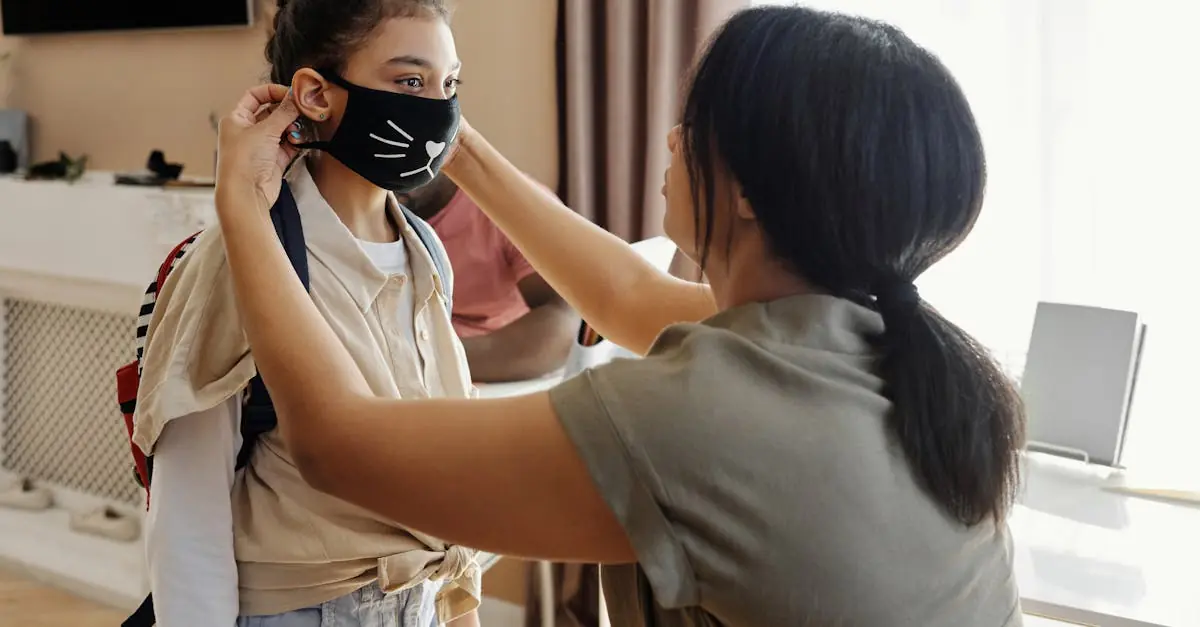Co-parenting can be a circus act, especially when both parents are still in a relationship. Picture this: juggling schedules, sharing parenting duties, and navigating the minefield of conflicting parenting styles—all while trying to keep the romance alive. It’s like trying to dance the tango while balancing on a tightrope. One misstep and it can all come crashing down!
Table of Contents
ToggleUnderstanding Inappropriate Co Parenting
Inappropriate co-parenting occurs when parents engage in behaviors that negatively impact their child’s well-being while still maintaining their romantic relationship. This can manifest through poor communication or lack of respect between partners.
Definition of Inappropriate Co Parenting
Inappropriate co-parenting refers to actions or communication styles that undermine effective parenting. It includes scenarios where one parent criticizes the other in front of the child, shares adult issues that confuse or burden the child, or fails to coordinate on important parenting decisions. Cooperation should always be the goal, but when parents disregard each other’s roles, the child suffers. Healthy co-parenting enables stability and a supportive environment for all involved.
Signs of Inappropriate Co Parenting
Several indicators reveal inappropriate co-parenting. Frequent arguing about parenting decisions in front of the child suggests a lack of unity. Ignoring the child’s needs or preferences can create confusion and anxiety. Another warning sign includes using the child as a messenger between parents, which strains the child’s emotional well-being. Parents who openly criticize each other or speak negatively about their relationship in the child’s presence demonstrate detrimental behaviors. Recognizing these signs is crucial for maintaining a healthy family dynamic.
Impact on Children
Inappropriate co-parenting while in a relationship can significantly impact children. These effects manifest across emotional and behavioral dimensions.
Emotional Consequences
Children in such environments often experience anxiety and confusion. Frequent conflicts between parents create a climate of instability. Furthermore, children may feel torn between their parents, leading to guilt and stress. Consistent feelings of insecurity can develop when parents fail to model effective communication. In addition, a child’s emotional development suffers, diminishing their ability to form trusting relationships in the future.
Behavioral Effects
Behavioral changes often stem from inappropriate co-parenting. Some children display increased aggression or withdrawal in social situations. Disrupted routines lead to difficulties in concentration and academic performance. Additionally, children might act as intermediaries between their parents, inadvertently taking on adult responsibilities. Other behaviors include refusal to engage with peers, which manifests as loneliness or isolation. These adverse effects underline the importance of stable and healthy parenting dynamics in safeguarding a child’s well-being.
Challenges for Parents
Managing a romantic relationship while co-parenting presents several challenges. Parents often face difficulties in communication, trust, and respect, which can negatively affect their child’s environment.
Communication Issues
Miscommunication frequently arises when parents’ priorities clash. Each may interpret messages differently, leading to misunderstandings. Parents might neglect to discuss important decisions, leaving one unaware of the other’s plans. Frequent arguments often occur, especially when disagreements arise about parenting styles. Effective communication, rooted in clarity and patience, remains essential for a successful co-parenting dynamic.
Trust and Respect Deterioration
Erosion of trust frequently happens when parents emphasize personal grievances over children’s needs. Disrespectful interactions, such as undermining each other’s authority, can create tension. Consequently, children may feel caught in the middle, intensifying their emotional turmoil. Trust begs for reassurance, yet constant critique chokes that possibility. Prioritizing respect is vital for nurturing a cooperative and healthy parenting relationship.
Strategies for Improvement
Improving co-parenting dynamics while in a relationship requires intentional strategies. Engaging in effective techniques makes a significant difference in family stability.
Open Communication Techniques
Active listening fosters a positive dialogue. Parents can express their thoughts and feelings without interruption. Regular check-ins provide a structured way to discuss parenting goals, schedules, and concerns. Sharing updates about children’s needs ensures everyone is on the same page. Focused conversations minimize misunderstandings and create a supportive atmosphere. Utilizing “I” statements helps to express personal feelings clearly, reducing defensiveness. Additionally, setting aside quiet time for discussions strengthens emotional understanding and creates a safe space for both parents and children.
Setting Boundaries
Establishing clear boundaries is essential for co-parenting success. Parents should define roles and responsibilities to avoid conflicts. Creating parenting agreements outlines expectations and ensures accountability. Discussing sensitive topics privately prevents potential disagreements in front of children. Respecting each other’s decisions fosters trust and transparency. Providing consistent routines for children helps them adjust to boundaries. Additionally, allowing personal time for each parent supports individual well-being, which ultimately benefits family dynamics. Prioritizing boundaries contributes to harmony and nurtures a supportive environment for children.
Seeking Professional Help
Seeking professional help can be a significant step toward improving co-parenting dynamics while in a relationship. Therapy provides a safe space to address inappropriate behaviors and conflicts.
When to Consider Therapy
Considering therapy becomes crucial when conflicts disrupt daily life. Frequent arguments in front of children signal a need for intervention. Parents may also notice emotional distress in their child, which could indicate underlying issues. If one parent feels overwhelmed managing their role, it’s wise to seek assistance. Two parents may struggle to communicate effectively, leading to misunderstandings. Recognizing these patterns early can help minimize long-term effects on children.
Choosing the Right Professional
Choosing the right professional ensures the effectiveness of therapy. Look for a therapist specializing in family dynamics or co-parenting. Credentials and experience matter, as they provide insight into the therapist’s approach. Evaluate whether the professional encourages open dialogue and supports both parents equally. Consider scheduling an initial consultation to gauge compatibility. Selecting someone who resonates with both parents enhances the likelihood of positive outcomes.
Navigating co-parenting while in a romantic relationship is a delicate balancing act. When inappropriate behaviors arise, they can have lasting impacts on children’s emotional and behavioral well-being. Recognizing and addressing these issues is vital for fostering a supportive family environment.
By prioritizing effective communication and setting clear boundaries, parents can mitigate conflicts and create a nurturing atmosphere. Seeking professional help can also be a valuable step in resolving deep-rooted issues. Ultimately, a commitment to healthy co-parenting practices not only benefits the parents but also ensures a stable foundation for the children.






